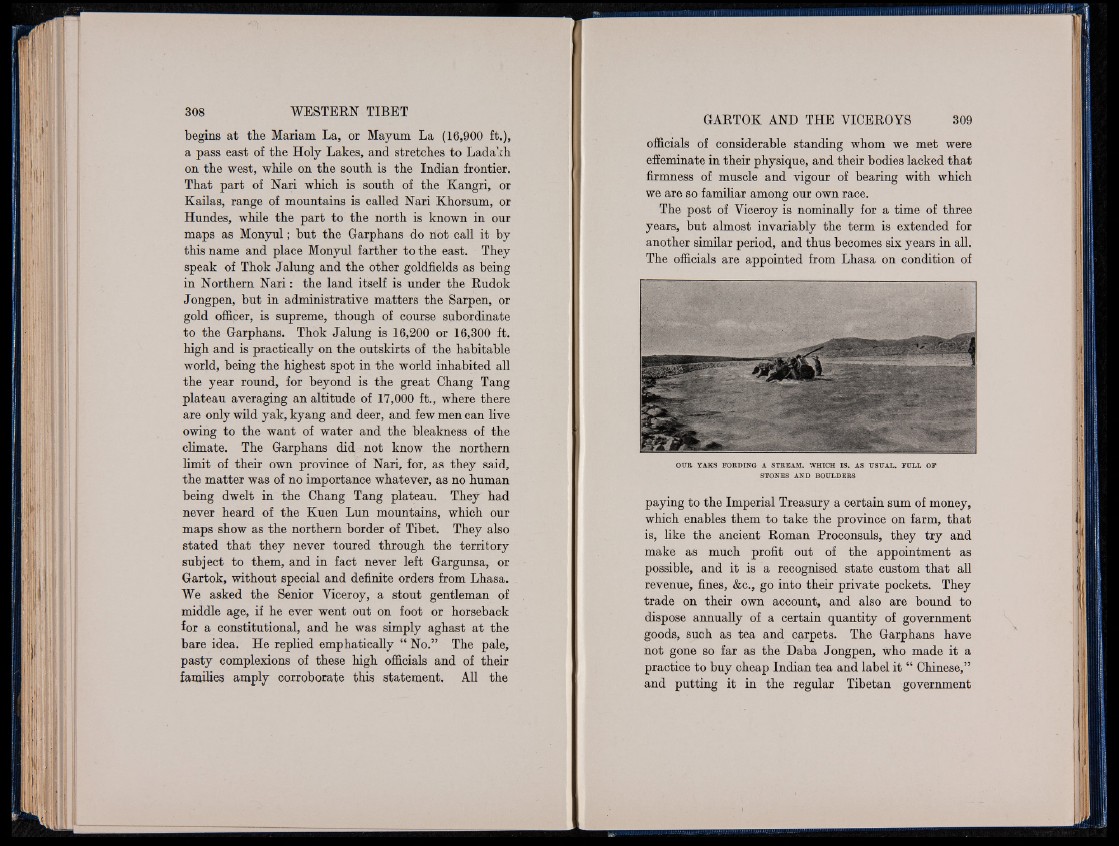
begins at the Mariam La, or Mayum La (16,900 ft.),
a pass east of the Holy Lakes, and stretches to Ladakh
on the west, while on the south is the Indian frontier.
That part of Nari which is south of the Kangri, or
Kailas, range of mountains is called Nari Khorsum, or
Hundes, while the part to the north is known in our
maps as Monyul; but the Garphans do riot call it by
this name and place Monyul farther to the east. They
speak of Thok Jalung and the other goldfields as being
in Northern N a ri: the land itself is under the Rudok
Jongpen, but in administrative matters the Sarpen, or
gold officer, is supreme, though of course subordinate
to the Garphans. Thok Jalung is 16,200 or 16,300 ft.
high and is practically on the outskirts of the habitable
world, being the highest spot in the world inhabited all
the year round, for beyond is the great Chang Tang
plateau averaging an altitude of 17,000 ft., where there
are only wild yak, kyang and deer, and few men can live
owing to the want of water and the bleakness of the
climate. The Garphans did not know the northern
limit of their own province of Nari, for, as they said,
the matter was of no importance whatever, as no human
being dwelt in the Chang Tang plateau. They had
never heard of the Kuen Lun mountains, which our
maps show as the northern border of Tibet. They also
stated that they never toured through the territory
subject to them, and in fact never left Gargunsa, or
Gartok, without special and definite orders from Lhasa.
We asked the Senior Viceroy, a stout gentleman of
middle age, if he ever went out on foot or horseback
for a constitutional, and he was simply aghast at the
bare idea. He replied emphatically “ No.” The pale,
pasty complexions of these high officials and of their
families amply corroborate this statement. All the
officials of considerable standing whom we met were
effeminate in their physique, and their bodies lacked that
firmness of muscle and vigour of bearing with which
we are so familiar among our own race.
The post of Viceroy is nominally for a time of three
years, but almost invariably the term is extended for
another similar period, and thus becomes six years in all.
The officials are appointed from Lhasa on condition of
OUR YAKS FORDING A STREAM, WHICH IS , AS USUAL, FU LL OF
STONES AND BOULDERS
paying to the Imperial Treasury a certain sum of money,
which enables them to take the province on farm, that
is, like the ancient Roman Proconsuls, they try and
make as much profit out of the appointment as
possible, and it is a recognised state custom that all
revenue, fines, &c., go into their private pockets. They
trade on their own account, and also are bound to
dispose annually of a certain quantity of government
goods, such as tea and carpets. The Garphans have
not gone so far as the Daba Jongpen, who made it a
practice to buy cheap Indian tea and label it | Chinese,”
and putting it in the regular Tibetan government